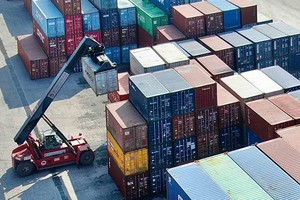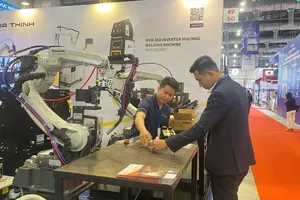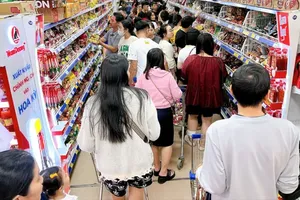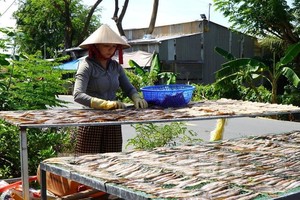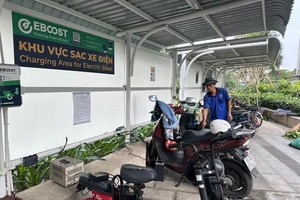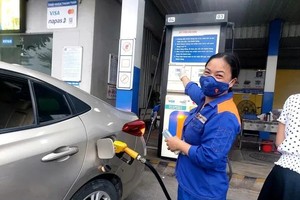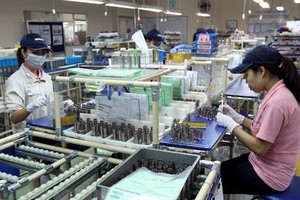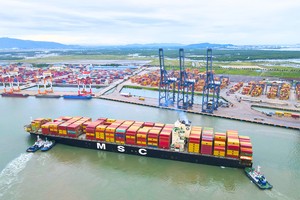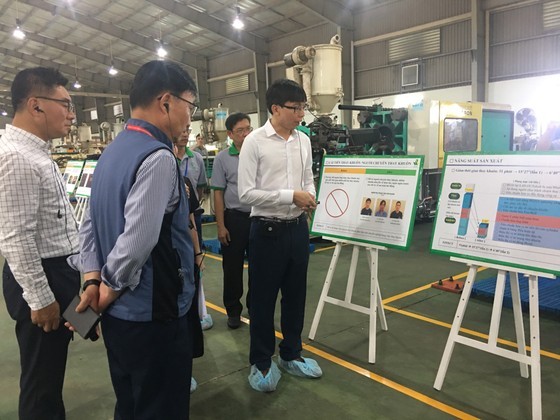 |
Samsung Vietnam experts help improve production processes at Viet Nhat Company |
Foreign investors continued to pour US$18 billion into Vietnam in the ten past months, an increase of 2.4 percent over the same period in 2022. This shows that Vietnam is still an attractive destination for foreign businesses. However, according to economic experts, the government need to have more solution to enhance the efficiency level of foreign direct investment.
Supply chain diversity
Mr. Nguyen Ngoc Thinh, General Director of Tien Thinh Company, said that the company's products can join the global supply chain to provide for businesses in Korea, Japan, the United States, and Europe. However, he revealed that to achieve this, businesses need to well understand their partners' culture while ensuring minimum requirements for cost, price, product quality, and fast and convenient delivery schedule.
Therefore, businesses must determine long-term investment with large capital but modest profits but they must make high-quality products as same as samples throughout the production process. Furthermore, a product not only satisfies general standards but also must meet different certifications according to that market. For example, products must meet CE standards if they are exported to the European market or the UL standard for the United States market and the JIS (Japan Industrial Standard) for Japan market.
On the other hand, businesses must implement high automation combined with streamlining in management to increase price competitiveness with similar products.
Ms. Le Nguyen Duy Oanh, Deputy Director of the Ho Chi Minh City Center for Supporting Industries Development under the Ho Chi Minh City Department of Industry and Trade, said that currently, some domestic enterprises have access to global supply chains. More than 400 groups of components and equipment were displayed at the recent program to connect foreign enterprises producing end products organized by the Center for Supporting Industries Development with the participation of more than 300 enterprises. The display achieved success when many businesses received new orders one after another.
Moreover, in October 2023, Ho Chi Minh City organized a delegation of 30 supporting industry enterprises to participate in a trade connection exhibition in Japan, through which businesses had the opportunity to access many new orders from the market.
More solutions needed to improve domestic enterprises’ internal strength
According to supporting industry enterprises, the current order trend is different. Accordingly, a majority of orders for equipment relate to the medical field, artificial intelligence, and robots. Vietnamese businesses that want to supply large corporations are always required to invest in large machinery and equipment, which are difficult products with low output.
This requires Vietnamese businesses to quickly change their production strategies. Currently, there are about 5,000 supporting industry enterprises across the country, mainly providing raw materials, spare parts and components for enterprises producing end products in automotive, electronics, mechanical, textiles, and footwear.
Of these, nearly 90 percent are small and medium-sized enterprises with 300 employees or less. Thus, requirements such as the supply of raw materials, components, input accessories, technology, machinery and equipment, human resources, and achieving standard certification according to international standards are huge challenges for Vietnamese businesses. Additionally, businesses also face many other difficulties such as a lack of opportunities to reach customers due to lack of access to market information and failure to meet customer requirements.
A representative of the Department of Industry and Trade of Ho Chi Minh City emphasized that the characteristics of supporting industry enterprises are heavy capital but modest profits whereas the pressure to compete on price with similar products in the global supply chain is huge. Therefore, there needs to be policies to support businesses financially to lower investment costs, especially businesses operating in Ho Chi Minh City.
At the same time, it is necessary to have new industrial parks, build factories, and select key enterprises to lease at reasonable and long-term prices so that businesses can reduce investment costs. In addition, most supporting industry enterprises are small-scale, so if they cooperate in a group association model to jointly place orders to import materials, they can access the source of raw materials at better prices.
According to economic experts, FDI enterprises will still lead industrial development in the coming time. Therefore, along with supporting businesses to improve their internal resources, ministries and localities need to change their approach to FDI. Accordingly, there needs to be consistent criteria for selecting investors in all localities to ensure investment attraction according to the needs of the economy.
In addition, incentives given to investors should be based on efficiency, domestically created added value, and post-investment operating results instead of based on registered capital and scale. Next, local governments should effectively connect domestic enterprises with FDI enterprises to help domestic enterprises participate in the supply chain of FDI enterprises for a solid foundation for the supporting industry’s sustainable development.










